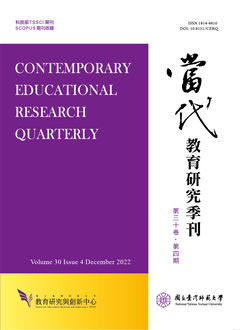

研究目的
本研究旨在關注臺灣與廣東二地師培大學師資生的實踐性知識來源與轉化的立論基礎,探討實踐性知識生成、運用以及差異。期能透過這樣的研究揭開實踐取向師資培育的可行途徑與重點,以作為相關教育工作者發展理論與實際教學之參考。
研究設計/方法/取徑
基於研究對象經驗的多變與多樣性,本研究訪談採取半結構型個別訪談、半結構型焦點訪談、非結構型訪談及非正式訪談等,利用訪談了解職前師資生真實之想法,探討職前師資生反思實踐內容及其教學推理過程,與文獻相互驗證後,解釋師資生在學習過程難點並討論二地師資生建構實踐性知識的異同。
研究發現或結論
本研究將二地師資生放在一個框架中一起整體來看其共同的過程,歸納出臺灣與廣東二地師資生建構實踐性知識生成途徑,以教學案例及教學推理等策略運用實踐性知識,並提出二地師資生建構實踐性知識異同之處,研究結果顯示:師資生了解實踐性知識生成與增加實踐情境推理,可促進理論知識與教學實務連結,提升實踐性知識的成長。對臺灣與廣東二地師資生而言,實踐性知識之緘默性並不容易消化和理解,他們教育機智不足,自我修正、監控、情境敏感度等能力較經驗豐富教師薄弱。很難由短暫的實習經驗中轉化去創造某些情境來增長學生的學習動機,更遑論發展自我風格的教育意象。
研究原創性/價值
當討論到實踐性知識與教學實踐時,一般研究聚焦於二者的相互關係,而不地區教學者的實踐性知識生成、運用、異同,缺乏相關研究討論,由此凸顯本研究的價值。過去研究極少討論師資生實踐性知識生成與發展真實呈現,此種高成長性的認知能力養成,並非一蹴可幾,必須在極有規劃的課程安排下才能豐富自我經驗,成為個人的實踐知能。藉由本研究的進行,可以更有效的掌握師資生學習與專業發展的來龍去脈,使師培課程作理論與實務契合度與彈性的調整。
教育政策建議或實務意涵
針對研究結果,可以在理論與實務間得到更有效的整合與調解,讓師資培育課程開展更有方向性,也引導師資生更有結構的專業學習與發展。唯有如此,師資培育機構才能提供師資生豐富的教育理論,並且讓學生有很多機會參與解構現場實務的種種,成為知識與文化的再建構者。
Purpose
This research focused on the practical knowledge sources and theoretical transformation among student in teacher training universities in Taiwan and Guangdong. The acquisition, development, utilization and differences of practical knowledge were discussed. This study attempted to discover the tangible ways and critical points of practice-oriented teacher training. To offer information for future educators and teachers in the aspect of theoretical development and teaching practice.
Design/methodology/approach
To satisfy the diversity and variety of participants’ backgrounds. This study has collected student-teacher personal opinions with unconstructed, informal and semi-structured interviews, focus groups. The was applied to explore the teaching reflections and reasoning process among the student teachers. After the verification, explaining the difficulties that occurred during the training program among the student teachers was made. Furthermore, discussions had centered on the similarities and differences of acquiring practical knowledge amongst the student teachers in the two places.
Findings/results
This study has compared student teachers in Taiwan and Guangdong as a group to examine the training process and summarized a framework for practical knowledge acquisition, comprising of “four phases” and “three processes”.
Including teaching cases, prolonged teaching reasoning time and practical knowledge utilization. The similarities and differences of acquiring practical knowledge amongst the student teachers in the two places were discussed.
Research findings: The understanding of practical knowledge acquisition and practical situational reasoning among student teachers was beneficial to the connected theoretical knowledge and teaching practices. It also enhanced their development of practical knowledge.
For student teachers in Taiwan and Guangdong, the realization and understanding of practical knowledge’s reticence are challenging. They might need to enhance their tact of teaching. Their abilities in self-correction, monitoring, and situational sensitivity are weaker than experienced teachers. It is difficult to transform and create certain scenarios to increase students’ learning motivation within a short period of placement duration, let alone develop their teaching styles and images.
Originality/value
When talking about practical knowledge and teaching practices, most researchers focused on the relationship. There is a paucity in the literature to discuss the development, utilization, similarities and differences of practical knowledge amongst teachers from various areas. This was the exact contribution of the current study.
In the literature, there is a gap exploring the practical knowledge acquisition and development among student teachers. The development of this high-level cognitive ability does not achieve within short period of time. A detailed and well-structured training program will be required to enrich personal practical knowledge.
In conducting this study, the effective monitoring of the entire progression of learning and professional development of teacher education can be achieved. The connection between theory and practice for the teacher program can be adjusted more flexibly.
Suggestions/implications
According to the results, more effective integration and adjustment between theory and practice can be obtained. It would offer a clear direction for the teacher training courses and provide a better structure of professional learning and development. With these implications, institutions for teacher education can provide more educational theories and more chances for students to take part in teaching practice. Such on-site experience would expand student’s understanding and allow them to be the reinventors of knowledge and culture.

本著作係採用創用 CC 姓名標示-非商業性 3.0 台灣 授權條款授權.
本刊國立台灣師範大學教育研究與創新中心
106台北市和平東路一段162號 | 電話: 02-7749-3670 | E-mail: cerecerq@gmail.com
教創中心 | 師大 | 電子報 | 線上投審系統
本刊由國家科學及技術委員會人文社會科學研究中心補助經費
© 2014 CERI-NTNU
